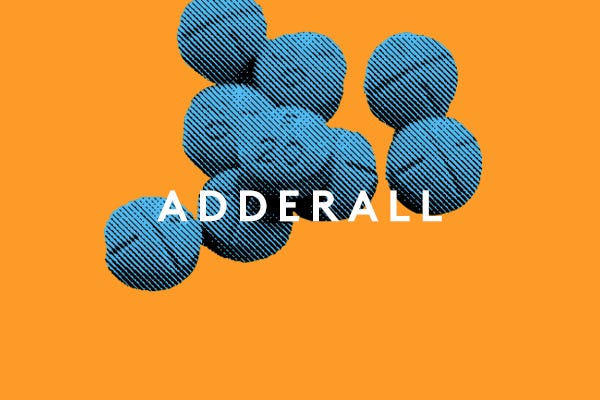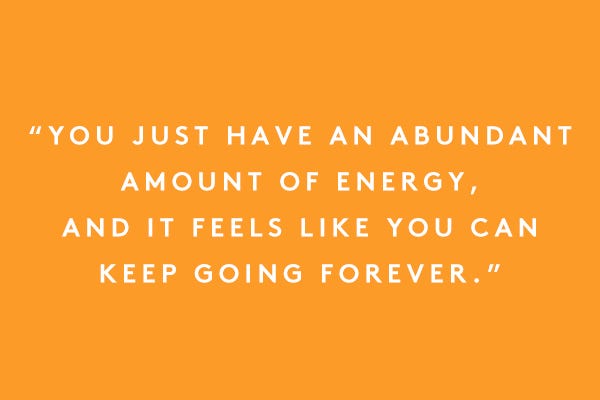Adderall: The Truth About How We Use It
 Illustrated By Gabriela Alford.
Illustrated By Gabriela Alford.
"I know I can't take Adderall again," says 26-year-old Melissa. While it helped her study and stay awake in college, for Melissa, the drug that had once helped her concentrate had finally lost its allure.
Adderall, often used to treat the symptoms of ADHD, has long been a phenomenon on college campuses for its study-enhancing properties. At some schools, up to a quarter of the students have reported using it. At one university, there is even an “Adderall Fairy," who stealthily deposits pills around the campus and leaves cryptic clues for students in need to follow.
AdvertisementADVERTISEMENT
But, what happens when those kids graduate? While the use of prescription stimulant drugs like Adderall has become more and more prevalent during the school years, it also doesn’t seem to be dropping off once they leave. In fact, prescriptions for Adderall increased two-and-a-half times between 2007 and 2011 for those ages 20 to 39. Surely, that increase can’t be solely attributed to those worried about midterms.
So, college study drug or something else? We investigate who is using Adderall, how they’re using it, and the dangers of simply popping a few pills without a proper prescription.
 Illustrated By Gabriela Alford.
Illustrated By Gabriela Alford.Adderall is a combination medication, consisting of two isomers of amphetamine, dextroamphetamine (D), and levoamphetamie (L), as well as four salts. Two preparations are available: Adderall, which is considered the most immediate option and lasts six hours, and Adderall XR, which is the extended release form and lasts for 12 hours. The drug is also available in generic versions, simply called “amphetamine salts.”
Like many brain-targeted medications, the exact mechanism by which the drug works is not totally clear. But, here's the gist: It increases the quantity of the neurotransmitters dopamine and norepinephrine in the brain, which amplify concentration and awareness while also conjuring up a sense of euphoria. For those with ADHD, Adderall and drugs like it can enable them to lead full, healthy lives. But, for those without ADHD or without a prescription for the drug, these drugs can be a mixed bag.
 Illustrated By Gabriela Alford.
Illustrated By Gabriela Alford.Risks are a varied lot, stretching from the minor bothers of dizziness and dry mouth to serious conditions like seizures and cardiovascular irregularities. Psychosis is rare, but possible, especially in cases of addiction. For more on the drug’s dark side, we might look to the tragic case of Richard Fee, a college student who began taking the drug to focus and found himself addicted and suicidal. Fee ultimately took his own life.
AdvertisementADVERTISEMENT
With an increase in users, there has been a concurrent rise in related emergency room visits. This past August, the Substance Abuse and Mental Health Services Administration (SAMHSA) released findings that indicated that stimulant-related emergency hospital visits for those aged 18 to 34 nearly quadrupled between 2005 and 2011. Although it does not specifically call out any particular drug, Adderall is included in this category. And, let's not forget the skyrocketing prescriptions of Adderall in this very same age group.
The report says that of the total number of stimulant-related emergency room visits examined, 30% each year also involved alcohol. So, it seems that perhaps not everyone is taking the medication as safely as they should.
 Illustrated By Gabriela Alford.
Illustrated By Gabriela Alford.But, are the risks of taking Adderall and stimulant drugs exaggerated by a pearl-clutching public? When Slate writer Joshua Foer asked six psychiatrists about whether using the drug without a prescription for “performance-enhanced journalism” would be safe, they told him, with a few caveats about medical background, that the occasional pill would likely be relatively harmless. But, despite getting the unofficial go-ahead, Foer’s essay culminates with his rejection of the drug for long-term use. Yes, it helped him write more, but ultimately, he didn’t feel it helped him write better.
We asked Dr. Timothy Wilens, a child, adolescent, adult, and addiction psychiatrist as well as the Director of the Center for Addiction Medicine at Massachusetts General Hospital, a similar question: Is it possible to use Adderall without a doctor’s guidance? He replied, “I would say that it’s always in your best interest to have someone sit down to help you walk through what’s wrong with you… For most people, it’s probably going to be okay because the medicines are pretty safe. But, I think you deserve the ability to sit across from somebody and say, 'What might be going on with me?'”
AdvertisementADVERTISEMENT
Consulting with a doctor before taking Adderall is important and preferable because of the potential for abuse. But, because it's often considered "safe" and so many people are taking it without doctors' orders, why are they doing it? And, what are the dangers?
 Illustrated By Gabriela Alford.
Illustrated By Gabriela Alford.Most of the focus, from both the media and the medical community, is on non-ADHD use of Adderall. Regarding who is actually using the drug without a prescription, Dr. Wilens insists that there is no simple answer. “First of all, half of them have a substance issue,” he told us. “They may be drinking too much, smoking marijuana too much, or have a more serious drug problem… The other half may be self-medicating ADHD symptoms, are just struggling, and really find that it helps.”
Indeed, many people are first exposed to Adderall during college. Carol, a college student, reported using the drug for studying, describing it as a “seasonal” habit. “You just have an abundant amount of energy and it feels like you can keep going forever,” she told us.
And, then there’s the partying. Another student we spoke with, Amy, used Adderall specifically for that purpose, though she had only taken the drug twice.
“I’ve taken it after I’ve already been drinking,” she shared. “If I’m feeling tired and I know it’s a long night where I actually can’t even go home and sleep, I take it to keep me going and amplify the feeling of being drunk.”
But, once young people begin taking Adderall in college, they sometimes continue taking it even after moving out of the dorm. Young professionals also find themselves benefiting from the “cognitive steroid.” We spoke to Katy, 26, who was prescribed Adderall at the tail end of college. She had not expected to be diagnosed with ADHD, and had gone to the doctor for other reasons.
AdvertisementADVERTISEMENT
“It was a weird time for me personally,” she told us. “I was somewhat shocked when I was diagnosed. That was not what I was going there with questions about.”
 Illustrated By Gabriela Alford.
Illustrated By Gabriela Alford.Katy takes one pill a day before heading off on her commute. Reflecting on her usage over the past five years, she notes that she probably could get by without the drug, but that it makes certain tasks easier: “I certainly feel the benefit of going to work in the morning, still tired and not wanting to, but taking something that makes me do it.”
While for Melissa, as she got older, the allure of partying late with the help of her medication, then amping up in the morning to head to classes and internships, began to lose its appeal. "I was taking it to stay out partying all night, then taking it again to get up to go to class or work or whatever," she said. "For me, it was a vicious cycle."
Though we often imagine that using stimulants to party is a college vice, it seems this isn't necessarily so. Another woman in her mid-20s, Harper, said she knows “about five to 10 friends who have used Adderall to party harder or longer.” She continues, “When my best friend went to Miami for a bachelorette party, the bride made sure to have Adderall so they could stay out all night dancing.” And, Melissa said that while the drug is super-prevalent in the high school and college set, that "it's still very popular in the party scene for older people." From the frat party to the bachelorette party, meds that make us party harder seem to be a mainstay.
AdvertisementADVERTISEMENT
 Illustrated By Gabriela Alford.
Illustrated By Gabriela Alford.It's notable that all the women we spoke with expressed varying degrees of personal discomfort with their use of the drug. Though no one addressed the specific dangers of the drug, those without a prescription acknowledged that their use might be problematic. And, they might be right (especially in the case of partying on the drug). Remember how many ER visits involved Adderall/alcohol combos.
Carol said, “I know that I shouldn’t be doing it and that if I really think I need it, then I should go see my doctor.”
Similarly, Harper said, “When I step back and look at myself, it’s one of the riskiest behaviors I engage in, considering two of the three times I’ve taken Adderall, I’ve been able to drink so much that I blacked out for multiple hours. That can’t be good for me, so I can’t say that it’s harmless.”
For Melissa, her drug use took on a life of its own and she ultimately sought professional help to cease the habit.
 Illustrated By Gabriela Alford.
Illustrated By Gabriela Alford.“I think it’s disingenuous to think it’s just one simple thing,” Dr. Wilens said. Sure, the usual narrative of stressed-out college students turning to amphetamines to focus more readily — with or without ADHD and a doctor’s prescription — still dominates our conversations about Adderall and stimulant medications. But, perhaps it’s time to start asking questions about what’s happening to this generation of Adderall users as they're become adults.
Legitimate ADHD doesn't just go away, so these people will likely continue to use medication and therapies in some combination. But, what about the kids using stimulants recreationally — to party harder or pay attention longer? What happens to them? It seems that some small portion will burn out on the drug, but, for others, it's a habit that might be taking us well into our twenties and beyond. Only time and individual experience can reveal whether our culture's love of stimulants harms or helps.
All names of correspondents have been changed to reflect their wishes to remain anonymous.
AdvertisementADVERTISEMENT






